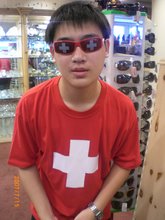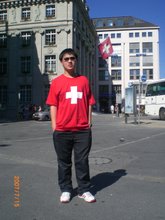Für Deutschkurs,Relationship between prepositions and aritcles(Dativ)

(Attention: The following materials are appropriate for either Deutschkurs A1,3 students or students with advanced German language-related levels. If not, people will suffer from dizziness,vomit and nightmare dreaming,etc.when appreciating the follow materials. Parental guidance is recommended)
德文既Artikel有時真係好好好混亂,例如有時候一個女性既名詞(Die)(當係Nom.同Akk.)係會喺Dativ會轉成男性既Artikel-der等等; Den本來係Akkusativ既男性Artikel,但係Dativ中佢係眾數Artikel等等。德文有4格 Nominativ (主格), Akkusativ (直接受格), Genitiv (屬格) and Dativ (與格)。到目前為止,Deutschkurs中已經教左頭3格,而Genitiv未教到
The German articles are extremely confusing and difficult to memorize their transformations which can be divided into ‘genders’ and ‘case’- Nominativ (主格), Akkusativ (直接受格), Genitiv (屬格) and Dativ (與格). I have drawn a conclusion of article transformations as a mnemonic method
We have not yet taught “Genitiv”
Nom.=Nominativ, Akk.=Akkusativ, Dat.=Dativ
Masculine:Der/ein(Nom.), Den/einen(Akk.), Dem/einem(Dat.)
Feminine: Die/eine(Nom.), Die/eine(Akk.), Der/einer(Dat.)
Neuter: Das/ein(Nom.), Das/ein(Akk.), Dem/einem(Dat.)
All Genders Plural: Die(Nom.), Die(Akk.), Den(Dat.)
When some particular prepositions are in front of articles, the articles should be changed into Dativ case according to the genders of a noun and whether singular /plural it will be, instead of using Nominativ and Akkusativ
Ex. Die Schweiz ist ein schönes Land in Europa
(Switzerland is a beautiful country in Europe)
Ex. Ich wohne in der Schweiz (I live in Switzerland, die--> der, Präposition“in“)
Ex. Das Telefon ist zwischen dem Drucker und dem Monitor
(The telephone is between the printer and the monitor. Der Drucker-->zwischen dem Drucker, Der Monitor-->zwischen dem Monitor)
#Ex. Die Stühle--> auf den Stühlen (on the chairs)
Ex. Die Zeitunge--> auf den Zeitungen (on the Newspapers)
Ex. Die Regale--> auf den Regalen (on the shelf)
Ex. Die Kinder--> für den Kindern (For the children)
# Some particular plural forms of Dativ,sometimes
(remember!SOMETIMES),must be added "n" as ending
Nominativ-->Nominative, Akkusativ-->Accusative, Dativ-->Dative, Genitiv-->Genitive















2 comments:
你咒我發噩夢
唔係...但可能會難到瞓係度
Post a Comment